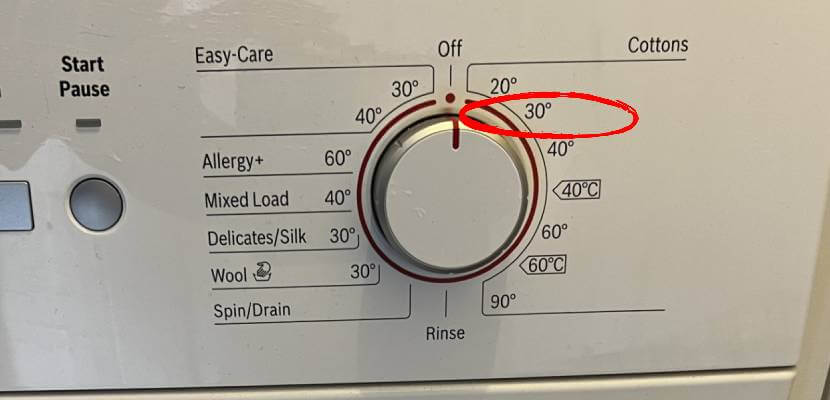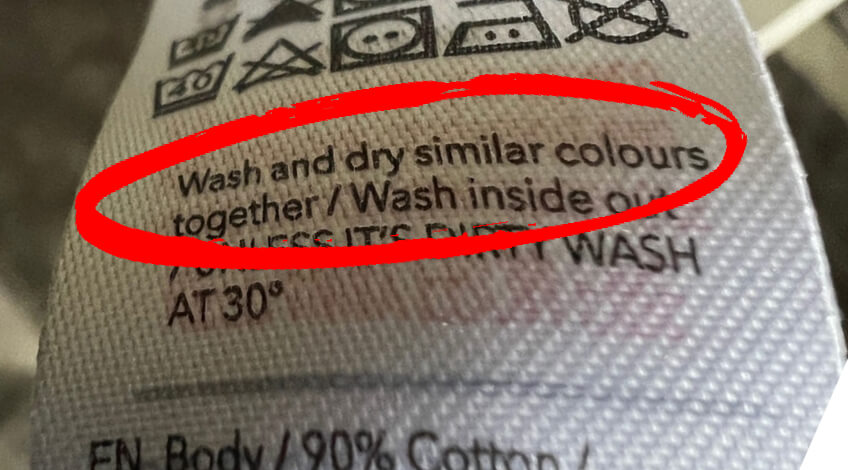
Don’t Have A Delicate Cycle On Your Washing Machine? (use this)
The delicate cycle on a washing machine is specifically designed for washing garments that are more prone to damage. This setting uses a gentle wash action and lower spin speeds to reduce the likelihood of snagging, tearing, or stretching fragile fabrics.
Typically, this cycle is ideal for materials like silk, lace, fine knitwear, and any clothing that is labelled “hand wash only.” But what happens if you don’t have the delicate cycle on your washer? Are your delicate garments doomed to a future of damage? Of course, not.
If you find your washing machine lacks a delicate cycle, don’t worry. There are several effective alternatives to achieve a similarly gentle wash for your delicate items, such as looking for an alternative programme, manually setting your washer, using mesh bags, and handwashing your fabrics.
Let’s have a closer look into your options in this article.
What To Do If There’s No Delicate Cycle On Your Washer
Delicate fabrics, especially those with embellishments or those made from silk, wool, or lace require more attention and care compared to hardy fabrics. Because of this, they often have to be washed using a specific setting, with the appropriate water temperature and low agitation.

This is why the delicate cycle helps extend the life of your cherished garments when cleaning them. After all, this programme uses low agitation and cooler water temperatures, making your fabrics clean and fresh without putting them under too much pressure. The result? Clean clothes that will last and look new for many years.
So what can you do if there’s no delicate cycle on your machine? Take a deep breath, and choose the method that works best for you:
Method #1: Look For Alternative Programmes
Don’t see the word “delicate” on your washer’s control panel? Don’t panic, as it may just be called a different thing by your appliance’s manufacturer. Remember, not all manufacturers call their programmes the same names.
For example, a delicate cycle on one washer may be called a gentle cycle on another. Or it might be called something similar, like “hand wash”, “light”, or “wool”, which are designed to mimic a gentle hand wash by adjusting the water temperature and reducing the spin speed, helping protect your delicate fabrics during the cleaning process.
The best way to know the programmes on your washer is to read its user manual. It will contain useful information about the different cycles that will help you choose which ones are best for the load you are planning to wash, without risking damage.
Method #2: Manually Set The Cycle Using Cold Water And Low Agitation
If your washer allows manual control over specific settings, you can always choose your own delicate cycle. Most washers have this option, so make sure to read your appliance’s user manual to get the most out of its features.

Select a cold water wash to prevent shrinkage and fading, and choose the lowest possible agitation and spin settings. Cold water is not only gentle on fabrics but also energy-efficient, and the low agitation helps to minimise the stress on your clothes during the wash cycle.
Method #3: Use Mesh Bags
If you only have the normal wash setting and cannot configure your machine, you may not be left with many options. To secure your delicate fabrics, you can always add an extra layer of protection using mesh laundry bags.
- ★Full Protection for your Clothes : Ultra soft and fine mesh laundry bags allow water and detergent to get through with no snagging,the laundry bags can full protect your clothes are mixed with each other and extend the life of your delicate garments through hundreds of wash cycles
- ★Prevents damage : Laundry bags are ideal for preventing damage to your clothes, cutting down friction and avoiding snags and tangles
Mesh laundry bags are widely available and inexpensive. All you need to do is simply place your delicate items inside the bag before washing. The mesh material allows the detergent and water to flow through while keeping your clothes safe from the pressure of the washer.
This reduces the direct friction on the fabric, preventing snags and tangles with other items in the load.
TIP: Don’t have mesh laundry bags yet? Use a pillowcase as an alternative.
Method #4: Handwash Your Garments
And finally, if you don’t have the delicate cycle on your washer and don’t want to risk damaging your fabrics by using other programmes, handwashing is your safest approach. Handwashing your delicate garments allows you to control the cleaning process closely, ensuring that delicate items are treated with the utmost care.
Just fill a basin with cold or lukewarm water and add a small amount of mild detergent. Then, submerge your garments and gently swirl them in the water. Make sure to avoid rubbing or twisting the fabric harshly.
After washing, rinse thoroughly with cool water until all soap is removed.
TIP: To make the process easier, spot-treat any stains using a stain remover or white vinegar before handwashing your fabrics.
Bonus Tips For Caring For Delicate Fabrics
Now that you know the other methods for cleaning your fabrics if the delicate cycle is not an option, you can now rest easy knowing that you’re not damaging your clothes during your laundry sessions.
Before we end this article, we wanted to share a few other care tips to make your delicate garments last a longer time!
Always Read Care Labels
The care label on your clothes contains the best information on how to clean, dry, and store them. Not reading these labels before putting your clothes, especially delicate ones in the washer can result in a disaster.

Make sure to check those little tags before popping your laundry in the washing machine. And of course, follow those instructions closely!
SEE ALSO: What Clothes Are Considered “Delicate Clothes”?
Invest In Quality Detergent
Using the right detergent can make a significant difference in the care of your delicates. Go for a mild detergent specifically designed for delicate fabrics.
- LAUNDRY DETERGENT - Our versatile liquid laundry detergent is perfect for all your washing needs—delicates, sensitive skin, sports gear, industrial cleaning, work clothes, and more. We've got you covered!
- FRESH LAUNDRY - Achieve outstanding washing results with our liquid detergent, effective even in cold water. Keep your whites brilliantly bright and prevent color fading with our advanced colorfast technology—perfect for sustainable laundry care
Though they may cost a bit more, these detergents are less harsh and help to preserve the integrity and appearance of your delicate items over time.
WARNING: Avoid using bleach or fabric softeners, which can degrade delicate fibres and coatings.
Dry Delicates Properly
How you dry your clothes is as important as the method of washing when it comes to delicate items. If possible, avoid using a tumble dryer as the intense heat and tumbling action can be harsh on your sensitive fabrics.
Instead of tumble drying, go for air drying. Lay the delicate fabrics flat to dry on a clean towel, reshaping the item as needed to prevent stretching.
For items that are less prone to stretching, like light blouses or scarves, hanging them on a hanger to air dry is also a good option.
TIP: Make sure to avoid direct sunlight when drying delicate garments, as it can fade colours and weaken their fibres.
Store Delicates Carefully
Proper storage is key to maintaining the quality of your delicate garments. Use padded hangers for items like dresses and blouses to prevent stretching at the shoulders.
For knitwear, avoid hangers altogether as they can cause the fabric to stretch and deform. Instead, fold these items and store them in drawers or on shelves. Additionally, consider using garment bags for very delicate items like evening wear to protect them from dust and accidental snags.
Regular Maintenance
Regularly check your delicate items for any loose threads, buttons, or potential weak spots.
Addressing these issues ASAP can prevent further damage, especially during washing. Also, ensure that zippers are fastened and hooks are secured before washing to avoid snagging other garments.
Know Your Fabric
Understanding the different needs of various fabric types can also enhance your care routine.
For instance, silk is highly delicate and usually does best with handwashing or a specific silk wash programme if your machine has one.
Wool requires cool temperatures and minimal agitation to prevent shrinking and felting. And lace, being very intricate, should always be placed in a mesh bag to avoid tears and snags.
TIP: If you have your doubts about cleaning special fabrics on your own, you can always have them dry cleaned by a professional.
And there you have it! Owning delicate fabrics does require more patience and care, but once you get the hang of cleaning them, it’s just another thing you can easily do on your regular laundry sessions.
Do you have tips to share? Or questions to ask? Feel free to leave a comment below, and we’ll be glad to answer them!
SEE ALSO: How Long Does The Delicate Wash Cycle Take? (and what it’s for)
Frequently Asked Questions
The delicate cycle on a washing machine is a specific setting designed for washing garments that are more susceptible to damage. It makes use of a gentle wash action and lower spin speeds to reduce the risk of snagging, tearing, or stretching delicate fabrics.
To wash delicates without a delicate setting, you can use alternative programmes on your washing machine that offer similar gentle care, manually adjust the washer to use cold water and low agitation, use mesh laundry bags to protect the fabrics, or handwash them instead.
On Samsung washing machines, the delicate cycle is often labelled as “Delicates” or “Hand Wash.” LG machines might call it “Delicate” or “Hand Wash/Wool.” Whirlpool typically labels it as “Delicate” or “Hand Wash.”
It is not recommended to wash everything on a delicate cycle because this setting uses lower agitation and spin speeds, which may not effectively clean heavier or more durable fabrics. It’s best reserved for materials that require gentle handling.
Clothes considered delicates include items made from fabrics like silk, lace, and fine knitwear, as well as garments labelled “hand wash only.” These typically require more careful handling to avoid damage during the cleaning process.
Also, follow us on Pinterest ...





